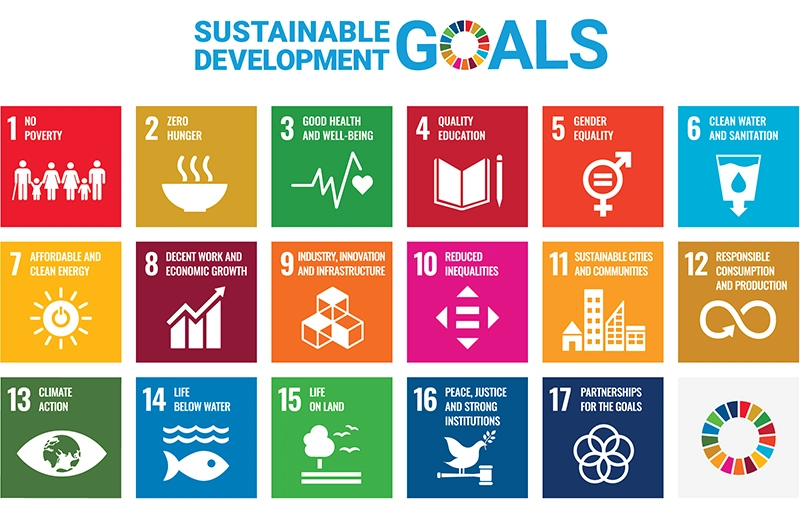Contribution to decarbonized society
Contribute to widespread use of clean energy through climate change response and environmental efforts
The Tokyo Century Group recognizes that addressing environmental issues is a key management concern and will thus seek to contribute to the creation of an environmentally sound, sustainable economy and society and a decarbonized society based on the United Nations Sustainable Development Goals (SDGs). To this end, the Group will act with due consideration for environmental issues, including the prevention of environmental pollution, reduction of greenhouse gas emissions, mitigation and adaptation to climate change impacts, and conservation of biodiversity and ecosystems, in all areas of its operating activities.
Our efforts to contribute to a decarbonized society include environmental activities in offices, the development of solar power and other renewable energy businesses, the promotion of the Financing Program for Joint Crediting Mechanism (JCM) Model Projects for reducing greenhouse gas emissions through collaboration with developing countries and for sharing emissions reduction benefits between involved countries, and other efforts for addressing climate change through our business activities.
We are also working to reduce Scope 3 emissions. For example, consolidated subsidiary Aviation Capital Group LLC (ACG) has ordered 60 new Airbus aircraft, including Airbus A220 aircraft that use 25% less fuel than prior models. Furthermore, we have set the target of amassing a fleet of 100,000 electric vehicles by fiscal 2030 in the Automobility segment. Through an organizational change undertaken effective on April 1, 2023, the Group’s domestic and overseas renewable energy and other environment and energy businesses were separated from the Specialty Financing segment to form the Environmental Infrastructure segment. The goal of this move is to strengthen and expand these businesses to better support business strategies for contributing to decarbonization. In the Environmental Infrastructure segment, we own and operate multiple solar power plants through Kyocera TCL Solar LLC and other subsidiaries. In addition, Tokyo Century established A&Tm Corporation as a joint venture together with Tokyo Gas Engineering Solutions Corporation and KYOCERA Communication Systems Co., Ltd. This joint venture provides asset and technical management services for solar power generation projects. A&Tm is combining the technological strengths of joint business partners to provide services for improving the generation efficiency and profitability of solar power plants. In the past, as a leasing company, our renewable energy businesses focused on growing our asset portfolios. Today, we are refining our approach to include the development of value chains that provide additional value in the form of software and services to expand existing businesses while creating new businesses.
- Contribution to the SDGs
-


Opportunities
- Expansion of scope of renewable energy and other environment-related businesses
Risks
- Emergence of stranded assets with high greenhouse gas emissions
Goals and Progress
Scrollable horizontally
| KPI | Metric | Unit | Target year | Target | Fiscal 2022 | Fiscal 2023 | Fiscal 2024 |
|---|---|---|---|---|---|---|---|
| Reduction of electricity use (environmental contributions through office activities) |
Electric use | kWh | Fiscal 2025 |
Less than 1,745,200kWh | 1,593,216 | 1,612,032 | 1,658,656 |
| CO2 emissions | t-CO2 | Fiscal 2025 |
Less than 300t-CO2 | 546 | 216 | 285 | |
| Reduction of gasoline use (environmental contributions through office activities) |
Gasoline use | L | Fiscal 2025 |
Less than 52,000L | 49,937 | 48,789 | 46,768 |
| CO2 emissions | t-CO2 | Fiscal 2025 |
Less than 119t-CO2 | 116 | 112 | 107 | |
| Fuel efficiency | km/L | Fiscal 2025 |
More than 15.5km/L | 16.1 | 17.3 | 18.0 | |
| Reduction of paper use (environmental contributions through office activities) |
Paper use (A4 size equivalent) |
Thousands of sheets | Fiscal 2025 |
Less than 9.5 million sheets | 9,457 | 8,703 | 8,057 |
| Reduction of head office electricity use (intensity target) | Per-area electricity use |
kWh/m2 | Fiscal 2030 |
Less than 56.9kWh/m2 (38% reduction in comparison with FY2009) | 67.69 | 66.94 | 61.91 |
| Reduction of annual CO2 emissions associated with head office electricity use (intensity target) | CO2 emissions from per-area electricity use |
t-CO2/m2 |
|
|
0.017 | 0.000 | 0.000 |
| Reduction of CO2 emissions through solar power businesses of consolidated subsidiaries*1 |
Annual generation volume |
MWh | Fiscal 2025 |
More than 557,500MWh | 536,591 | 560,575 | 589,967 |
| Reductions of CO2 emissions (compared with standard thermal power generation) | t-CO2 | Fiscal 2025 |
More than 210,456t-CO2 | 207,929 | 218,344 | 231,562 | |
| Electrified vehicle (EV, FCEV, PHEV, HV) ratio | Automobility*2 | % |
|
|
18.4 | 20.3 | 22.4 |
| Fuel-efficient aircraft ratio in the aviation business (ACG)*3 | Ratio of fuel-efficient aircraft assets*4 | % |
|
|
56.0 | 61.9 | 66.3 |
| Projected aggregate greenhouse gas emissions reductions from JCM Model Projects | Projected aggregate greenhouse gas emissions reductions | t-CO2 | Fiscal 2025 |
56,000t-CO2 | 38,343 | 43,034 | 48,176 |
|
Transaction volume*5 (leases, financing, investments, etc.) |
Renewable energy businesses (amount of investment in solar power and biomass power generation businesses, corporate power purchase agreements, and storage battery businesses)
Introduction of electric vehicles in Automobility segment Introduction of fuel-efficient aircraft in aircraft leasing businesses Joint crediting mechanism (JCM) business, etc. |
billion Yen |
|
|
296.2 | 344.7 | Under tabulation |
- *1Fiscal 2025 targets are for solar power generation company Kyocera TCL Solar LLC and 12 other consolidated subsidiaries.
- *2Automobility: Nippon Car Solutions Co., Ltd., and Nippon Rent-A-Car Service, Inc.
- *3Fuel-efficient aircraft: A220, A320neo, A321neo, A350, 737MAX, and 787
- *4Ratio of fuel-efficient aircraft assets: Ratio of fuel-efficient aircraft to all aircraft
- *5Calculated using amounts of lease and rental transactions, financing, investments, and sales based on internal sales management figures Scope: Tokyo Century Corporation and 15 major subsidiaries (FLCS Co., Ltd.; EPC Japan K.K.; Nippon Car Solutions Co., Ltd.; Nippon Rent-A-Car Service, Inc.; Kyocera TCL Solar LLC; Aviation Capital Group LLC; CSI Leasing, Inc.; Allegiant Partners Inc.; Tokyo Century (USA) Inc.; Tokyo Century Leasing (Singapore) Pte. Ltd.; Tokyo Century Capital (Malaysia) Sdn. Bhd.; TISCO Tokyo Leasing Co., Ltd.; HTC Leasing Co., Ltd.; TC Car Solutions (Thailand) Co., Ltd.; and BPI Century Tokyo Lease & Finance Corporation)
Initiative Example
Tokyo Century engages in renewable energy businesses, such as solar and biomass power generation, through collaborations with its partners, which represent one of its strengths.
In 2012, when the feed-in tariff (FIT) program started, we established Kyocera TCL Solar LLC through a joint investment with Kyocera Corporation. This company has been operating one of the largest solar power plants in Japan. We are also promoting biomass power generation through joint ventures with leading partners that include ITOCHU Corporation, JFE Engineering Corporation, and Forest Energy Inc.
To achieve our mid- to long-term goal of 1,000 MW of power generation capacity, we will expand our existing projects and develop new investments to help create a decarbonized society.
Nippon Car Solutions Co., Ltd. (NCS), in its auto leasing business for corporate customers, has been promoting the introduction of EVs, mainly to the NTT Group. Even before EVs attracted attention for their low environmental impact, NCS actively proposed the use of EVs as an emergency power source during times of disaster. Even now, NCS still handles the highest number of vehicles in the industry.
The company leverages its buying power for manufacturers and its strengths in total solutions, such as communication-type drive recorders and safe driving consulting to support the NTT Group, which intends to convert 100% of its company vehicles to EVs by fiscal 2030 under its EV100 initiative.
In addition, NCS works with NTT Group companies to propose EV packages to approximately 800 municipalities that have declared their commitment to carbon neutral. It cooperates with one of NTT’s close partners, a telecommunications construction company, to manage the installation and maintenance of charging facilities associated with the introduction of EVs. Furthermore, it will supply electricity derived from renewable energy sources in cooperation with NTT Group companies to help local governments achieve carbon neutrality.
The JCM has been established and implemented to quantitatively assess Japan’s contribution to the reduction and absorption of GHG emissions by diffusing excellent decarbonization technologies, products, systems, services, and infrastructure as well as by implementing other measures in developing countries, and uses the assessment results to achieve Japan’s reduction targets.
Tokyo Century is the first Japanese financial services company to serve as a representative participant of the JCM. We have partnered with local joint ventures in Southeast Asian countries to develop large-scale solar power generation projects using decarbonization technologies. From fiscal 2017 to 2023, a total of 15 projects were selected in Indonesia, the Philippines, Thailand, Myanmar, and Vietnam.
Tokyo Century’s Contribution to the SDGs
Tokyo Century is contributing to the enrichment of daily life and the sustainable development of society toward achieving the SDGs adopted as a shared responsibility for the international community at the United Nations Summit on Sustainable Development.
